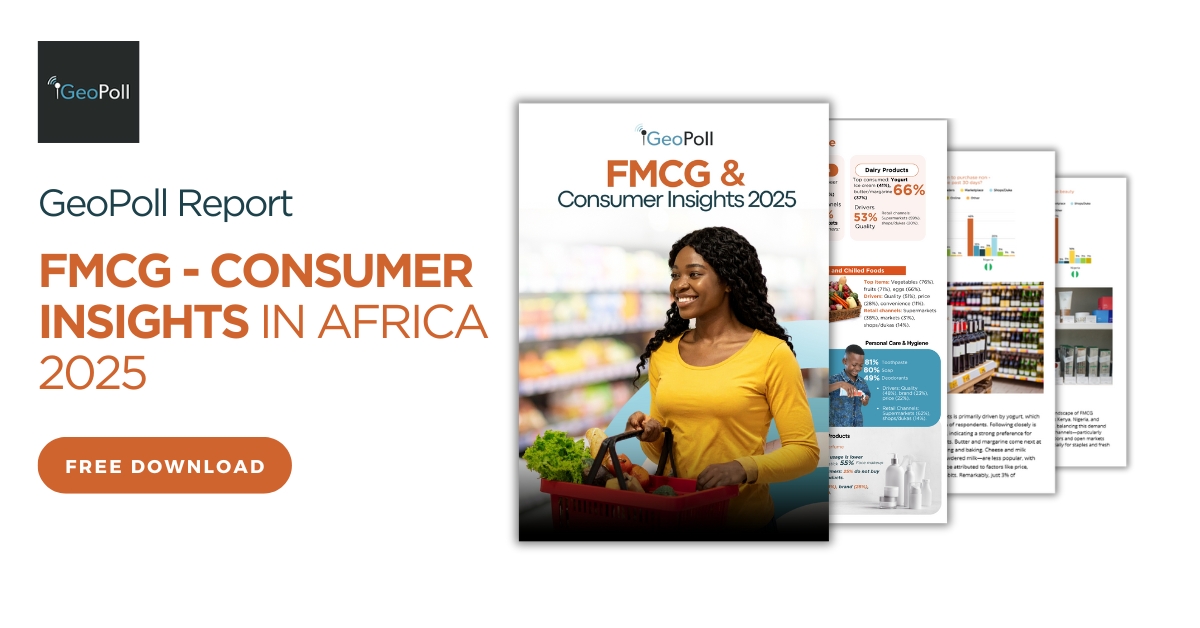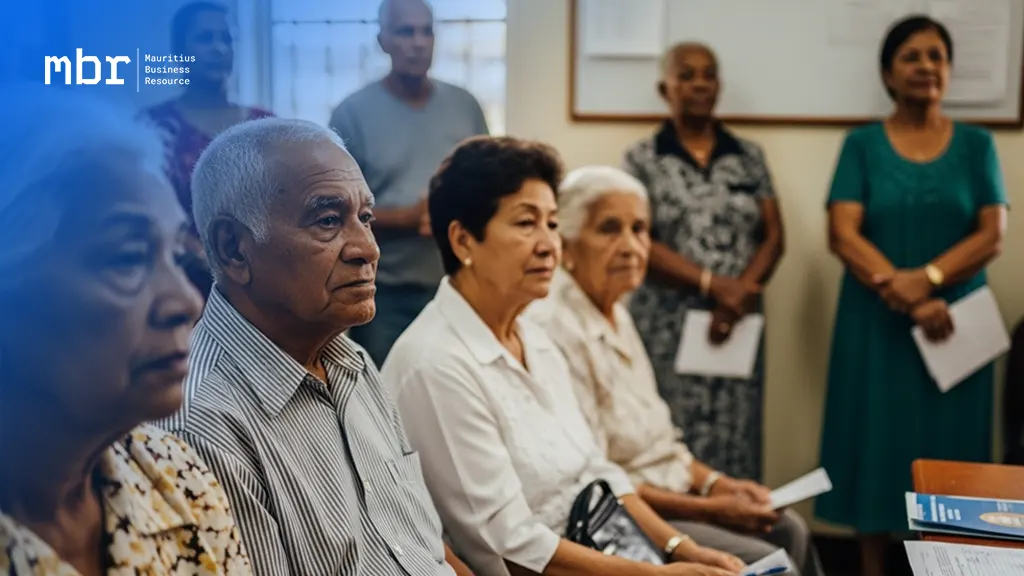Consumer Trends Africa
And why brands need to pay attention.
Africa is one of the fastest-growing consumer markets in the world – but it’s not business as usual anymore. In May 2025, GeoPoll conducted a study with over 2,500 consumers in three key African markets to understand what’s really driving their decisions in 2025. From the study, we can report deep shifts in behavior, expectations, and buying habits compared to previous similar studies.
If you’re responsible for growing a brand, launching a product, or owning market share, these are the changes you can’t afford to ignore.
Here are four big insights (among many more) from the FMCG & Consumer Insights in Africa 2025 report. The full report breaks down trends across ten FMCG categories and goes into critical differences by country, demographic, and channel.
1. Quality is the New Currency – across all FMCG categories
Across ALL ten FMCG categories studied, quality was the #1 factor driving purchase decisions, even above price and brand clout. Consumers in 2025 are choosing brands they trust, not just ones they can afford, even in staples like oil and sugar.
What this means for your brand:
Consumers are willing to pay more for trusted, safe, and effective products. Your brand’s integrity, consistency, and performance matter more than ever. If you’re competing solely on price, it might be time to rethink your value proposition.
2. The Omnichannel Battlefield: Supermarkets Are Winning- but Informal Channels Still Rule
Yes, supermarkets still lead the top purchase point in most categories. Yet informal outlets such as dukas, spazas, kiosks, and open markets are alive and thriving. And online channels, while small now, are gaining share, especially in beauty and packaged food.
What this means for your brand:
Winning in Africa means building an omnichannel strategy: maintain visibility in supermarkets, but don’t ignore the informal market where loyalty and convenience often reign or the emerging digital paths – you will leave revenue on the table.
3. There’s Growth Hiding in Plain Sight
Want to know where the next battle for consumer attention is? Look at categories with high non-consumption:
- 25% of consumers don’t buy beauty products
- 27% skip packaged food entirely
There are two ways to look at it as a brand – keep off, or take it as an opportunity!
What this means for your brand:
Brands that tailor their pricing, packaging, or awareness campaigns to these untapped segments can unlock a real competitive advantage.
4. Online Shopping Is Small but Growing-Fast
Online purchases remain under 5% in most categories, but in segments like beauty (10%) and packaged food, digital is a big option and is gaining real ground.
What this means for your brand:
Forward-thinking FMCG companies should begin investing in omnichannel strategies, particularly in urban centers where mobile usage is highest. It’s not about e-commerce dominance – it’s about early-mover advantage.
Get the Full Report
These are just a few of the findings from our new report: FMCG & Consumer Insights in Africa 2025
The comprehensive, 38-page report covers:
- 10 product categories: non-alcoholic drinks, alcoholic drinks, dairy products, snacks, staple foods, fresh and chilled foods, packaged food, personal care and hygiene, household care products, and beauty products and in-depth breakdowns of influencing factors, purchase channels, and country comparisons
- Real consumer data from Kenya, Nigeria, and South Africa
- Strategic takeaways for marketers and brand teams
Get the report for free on your email by filling out this quick form:
Or, if you’d like to explore how your brand stacks up or run a similar study, we can deliver results within hours. Contact us today to get started.
The post FMCG & Consumer Insights in Africa 2025: 4 Consumer Trends Reshaping the Industry appeared first on GeoPoll.
Consumer Trends Africa: Why Quality Reigns Supreme
One of the most critical Consumer Trends Africa in 2025 is the overwhelming preference for quality over price. Across diverse FMCG categories, African consumers increasingly favor brands they trust to deliver safe and effective products. This shift opens up remarkable opportunities for companies to emphasize product integrity and outperform competitors who merely compete on cost.

How Consumer Trends Africa Influence Shopping Channels
The 2025 report shows supermarkets maintaining dominance, yet informal markets continue to thrive. These evolving Consumer Trends Africa mean brands must adapt by staying visible across multiple channels, including the vital informal sector where loyalty is deeply rooted. Missing out on these pathways could mean leaving substantial revenue on the table.
Spotting Growth Gaps in Consumer Trends Africa
A fascinating highlight in Consumer Trends Africa is the untapped potential in categories like beauty and packaged food, where large groups still refrain from purchasing. Savvy brands that craft tailored campaigns and accessible packaging can capture these consumers and secure an early lead in these emerging markets.

The Digital Rise: Consumer Trends Africa and E-Commerce
Even though online purchases remain below 5% in many categories, segments such as beauty and packaged food are witnessing impressive digital traction. Forward-looking brands that invest now in omnichannel strategies aligned with Consumer Trends Africa stand to gain a competitive edge as digital adoption accelerates.
Leveraging Data to Navigate Consumer Trends Africa
Real-time data is crucial for decoding Consumer Trends Africa. Tools and methodologies that reveal how and why consumers choose particular products enable brands to make smarter, faster decisions. For more examples of how companies leverage data, visit Voice Mauritius News.
Consumer Trends Africa: Building Trust Through Transparency
In 2025, transparency has become a hallmark of trusted brands in Africa. As part of emerging Consumer Trends Africa, consumers are drawn to brands that openly communicate about sourcing, sustainability, and community impact. This trust translates directly into long-term loyalty.

The Future of Consumer Trends Africa: Adapt or Be Left Behind
The pace of change highlighted by Consumer Trends Africa suggests only adaptable brands will thrive. As quality, channel diversity, and data-driven engagement become non-negotiable, businesses must stay vigilant and responsive to consumer needs to secure their market share in Africa’s booming economy.
Consumer Trends Africa: Shaping Marketing Strategies
Marketing leaders are increasingly aligning campaigns with the latest Consumer Trends Africa insights. From focusing on quality narratives to leveraging local ambassadors, brands are finding new ways to resonate with audiences. This approach ensures marketing investments translate directly into loyalty and repeat sales.
Community Engagement Builds Deeper Connections
Across various African markets, brands that prioritize community support and local partnerships often see stronger consumer attachment. Initiatives like sponsoring educational programs or health drives show customers that businesses are genuinely invested in their well-being, fostering deeper brand connections.
Innovation in Packaging and Accessibility
Companies are innovating packaging to cater to different income levels and lifestyle needs. Small pack sizes or refill options are gaining traction, making products accessible to a broader demographic. This thoughtful approach to packaging is proving essential in unlocking new consumer segments.
Consumer Trends Africa: Future-Proofing Through Technology
Leveraging technology for everything from digital payments to personalized promotions is becoming a cornerstone of staying relevant amid evolving Consumer Trends Africa. Brands embracing tech solutions now position themselves for long-term success in Africa’s fast-changing consumer landscape.
Unlocking Consumer Aspirations: Beyond Basic Needs
In Africa’s dynamic consumer landscape, there’s an intriguing narrative unfolding that goes beyond the usual metrics of income levels and price sensitivity. As economies evolve, infrastructure improves, and technology becomes more embedded in daily life, consumer aspirations are shifting in profound ways. Today, many African consumers aren’t just looking to fulfill basic needs—they’re actively seeking brands that help them tell their own stories of success, growth, and modernity. Whether it’s a young professional choosing a trusted skincare product to project confidence at work, or a family investing in quality household items that symbolize stability, the choices extend far beyond utility.
This evolution has important implications for companies aiming to expand in Africa. It’s no longer enough to simply provide an affordable alternative. Brands need to understand the emotional drivers at play: the pride associated with international-quality standards, the sense of belonging that comes with using a popular local brand, and the aspirational leap represented by premium products. These psychological dimensions are reshaping purchase behaviors across categories from personal care to electronics.
Even more interesting is how social media amplifies these aspirations. Platforms like Instagram, Facebook, and TikTok aren’t just entertainment channels—they’re influential spaces where consumers discover trends, compare experiences, and share endorsements. A viral beauty hack or a proudly posted photo of a family’s new kitchen appliance can spark countless new purchasing journeys. The power of peer validation is immense. As Africans continue to connect and communicate digitally, brands that can weave themselves authentically into these stories stand to capture hearts and wallets alike.
Yet, fulfilling these aspirations demands a delicate balance. Consumers are savvy—they can distinguish between genuine engagement and opportunistic marketing. Brands that overpromise or fail to deliver consistent quality risk swift backlash, often spreading faster online than any campaign. This reality underscores why quality—consistently highlighted in Consumer Trends Africa—is so critical. A strong reputation built on real product performance not only attracts first-time buyers but also converts them into repeat customers and vocal advocates.
Moreover, as countries like Kenya, Nigeria, and South Africa become increasingly urbanized, consumers are exposed to diverse cultural influences, accelerating tastes for variety and novelty. It’s why we see rising interest in global luxury brands alongside passionate loyalty to homegrown favorites that evoke cultural pride. This creates a rich, competitive space where global giants and local innovators both have room to thrive—provided they stay tuned to what consumers truly value.
In this context, market research becomes not just a tool but a strategic necessity. By tapping into detailed consumer studies—such as the FMCG & Consumer Insights in Africa 2025 report—brands gain nuanced views into what drives aspirations, trust, and loyalty. They can segment markets more intelligently, craft messages that resonate on deeper levels, and launch offerings that feel tailor-made for specific demographics.
Ultimately, the story of Africa’s consumer market in 2025 and beyond isn’t merely about numbers. It’s about people striving for better lives and using the products they buy as markers of that journey. Brands that recognize this and position themselves as partners in these life stories are set to become more than just suppliers—they’ll become symbols of progress, woven into the very fabric of everyday aspirations across the continent.




